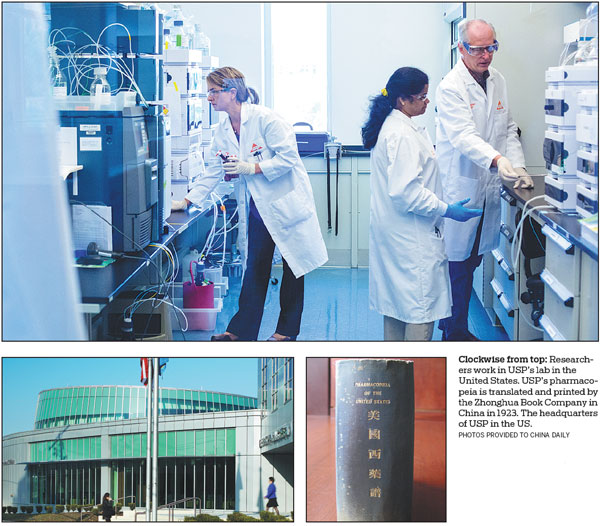USP's China journey improves health standards
Bilateral cooperation brings global improvement in medicine, healthcare

For nearly 200 years, the United States Pharmacopeia, or USP, has been building trust where it matters most: in the world's medicines, dietary supplements and foods. We don't do this important work developing quality standards alone. Our collaborations in China are a shining example of how vital cooperative relationships are to USP's success.
As the world gets smaller and more connected and global supply chains continuously grow more complex, collaborations such as those between USP and China's regulators and industries are more important than ever. This work has far-reaching impact, from helping more people to have access to quality-assured medicines that work as intended, to helping curb antimicrobial resistance and other urgent public health issues.
USP has a long history of partnering with the Chinese Pharmacopeia Commission on medicines and food quality standards. As early as in 1923, USP agreed that its pharmacopeia could be translated into Mandarin Chinese and printed by the Zhonghua Book Company on the premise that the Chinese government would adopt the translation as its first official pharmacopeia. The modern collaboration was launched in 1994 when Jerome Halperin, who was CEO of USP at the time, visited China to reintroduce USP to the Chinese government regulators responsible for medicines and food quality standards.
In 2007, USP opened its first facility in China in the Zhangjiang Hi-tech Park of Shanghai. Establishing this center, which included research laboratories and scientific support teams, was a significant undertaking. It recognized the importance of China in the global medicine supply as the largest supplier of active pharmaceutical ingredients and one of the largest prescription drug markets in the world. USP soon expanded its operations and moved to the China (Shanghai) Pilot Free Trade Zone in 2014 to a state-of-the-art laboratory occupying more than 10,000 square meters and nearly 80 staff members.
Since establishing a center in China, USP has made consistent contributions to improving quality standards of medicines and food ingredients by sharing scientific knowledge as well as providing reference standard products to over 1,000 pharmaceutical companies in China. And, in doing so, USP has developed close relationships with government regulators and the scientific community in the country. Currently there are three Chinese science organizations that are members of the USP Convention, a network of the global experts in science and health uniting to build trust in the world's medicines: the Chinese Pharmacopeia Commission, the National Institutes for Food and Drug Control, and the China National Center for Food Safety Risk Assessment. We are hoping to double the number of China-based USP Convention members by 2020.
USP applauds the impressive progress regulators and industries in China have made to improve healthcare services and public health. We look forward to continuing our collaboration in China to help improve the quality of medicines and the health of people the world over.

This article was written by Ronald T. Piervincenzi, chief executive officer of United States Pharmacopeia

(China Daily 11/06/2019 page6)














